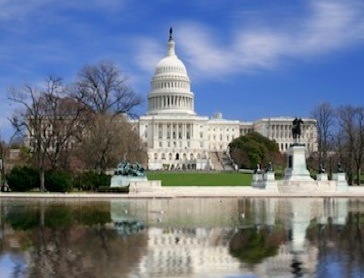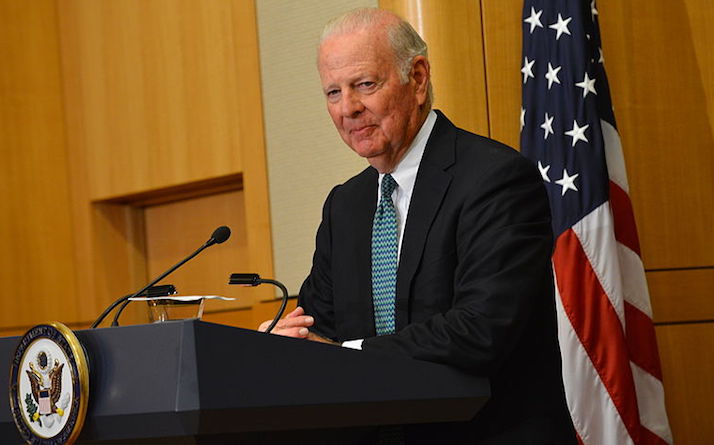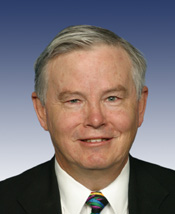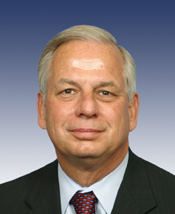 It can fairly be said that Texas took at least an indirect licking in last year’s presidential campaign and election.
It can fairly be said that Texas took at least an indirect licking in last year’s presidential campaign and election.
It wasn’t just that the Republican candidate, John McCain, won a sizable majority of Texans’ votes but was thumped in the national tally. Besides that, the winning Democrat waged a campaign brimming with criticism of the Texan in the White House, who was ending his second term with exceptionally low public-approval ratings. Targets of President Barack Obama’s campaign criticism included outgoing President George W. Bush’s stance on climate change.

James Baker
Bush resolutely opposed any mandatory limits on heat-trapping carbon dioxide. Obama took office in January after promising to sign what is known as a cap-and-trade bill to do just that. The cap-and-trade concept would limit (and thereafter reduce) emissions of CO2 by creating a market for tradeable emission permits, some of which would be sold by the government.
Last week, the House Energy and Commerce approved just such a bill, on a largely party-line vote of 33-25, but other formidable challenges that lie ahead mean its fate is far from clear.
Notwithstanding the big political changes in Washington on the climate issue that greatly reduced Texas clout there, influential Texas voices continued to make themselves heard during, and leading up to, the maneuvering over the cap-and-trade bill’s form and in the House committee debate itself.
Baker was serving as secretary of state in June 1992, when Bush and other world leaders, meeting at a gathering in Brazil called the Earth Summit, agreed to the United Nations Framework Convention on Climate Change (UNFCCC). The pact was aimed at stabilizing greenhouse gases in the atmosphere at a safe level. While it set no mandatory emission limits, the UNFCCC established the diplomatic groundwork for the later Kyoto Protocol, which did contain such limits but was never ratified by the U.S.For instance, James Baker, a Houston attorney who was secretary of state and then White House chief of staff in the 1989-1993 administration of President George H. W. Bush, weighed in on the issue in an opinion column published May 7 in the British newspaper Financial Times.
With that background – and in light of Baker’s own recent statements on the climate issue – it was no surprise that he argued in his Financial Times column that the U.S. should take the lead internationally on the climate issue, that a cap-and-trade regulatory approach “might work,” and that U.S. greenhouse regulations should be conditioned on a new international treaty that would include “China, India, Brazil and Indonesia.” (The Kyoto pact left out such developing nations, which was a major stated reason for President George W. Bush’s opposition to it.)

Joe Barton
Texas congressmen played key roles in the pre-debate negotiations over the cap-and-trade bill and then in the Energy and Commerce Committee’s debate itself, which culminated in the panel’s approval of the measure.
As the Wall Street Journal reported in the run-up to the debate, Democratic committee members Gene Green of Houston and Charlie Gonzalez of San Antonio initially withheld their support from the bill. They were seeking to persuade Rep. Henry Waxman, a California Democrat who chairs the committee, to allocate to the oil industry more of the emission permits that the measure would give to various industries for free. (Waxman is also an author of the bill, known as Waxman-Markey.)
“Mr. Waxman has said he is willing to give the industry one percent; Mr. Green is asking for five percent,” the Journal reported. As things ended up, the version of the bill that emerged from the committee gave two percent of the free permits to oil refiners, and Green and Gonzalez were among those voting for its passage.
The Houston Chronicle reported that “Green and Gonzalez also scored a major concession sought by oil companies when committee leaders scrapped a proposal that would impose steadily stiffer limits on transportation-related greenhouse gas emissions — and make the industry pay for allowances to cover the excess pollutants released when their fuel is burned.”
Leading Republican opposition to the bill was Joe Barton, former chairman of the Energy and Commerce Committee, who represents Texas’ Sixth Congressional District, which includes, and stretches southeast from, a part of Tarrant County including Arlington.
Barton is one of Congress’ most outspoken skeptics about the scientific findings that have fueled concerns over manmade global warming. He gave vent to his skepticism in attacking the need for a cap-and-trade bill to address the issue.

Gene Green
(Last year, in a long article in the Dallas Morning News exploring Barton’s thinking on climate change and future role in fashioning national policy to deal with it, Gonzalez was quoted: “He questions the science … My fear is that position really does take us out of play in coming up with a solution that is practical and viable.”)
A few days before the Energy and Commerce vote approving the Waxman-Markey bill, Barton went on C-SPAN to declare that passing it would be “the stupidest thing that Congress could do this year.”
In dramatic contrast to his fellow Republican Baker’s Financial Times declaration that it is “essential” for all major economies of the world to unite against “the threat of climate change,” Barton questioned carbon dioxide’s harmfulness:
I’m creating it as I talk to you. It’s in your Coca-Cola. your Dr. Pepper and your Perrier water. It’s necessary for human life. It’s odorless, colorless, tasteless, doesn’t cause cancer, doesn’t cause asthma. There’s nobody that’s ever been admitted to a hospital because of CO2 poisoning.
A dominant theme in the attack on the bill by Barton and other Republicans on the committee involved the price tag of its permit system. They argued that it “would impose high costs on American consumers and undercut the global competitiveness of U.S. businesses,” Jennifer A. Dlouhy reported in the Chronicle.
If an opinion column by Republican Rep. John Culberson of Houston is any indication, some Texas opponents of cap-and-trade (and perhaps others who take their lead from them) will focus on economic arguments in further battles over Waxman-Markey instead of echoing Barton’s skepticism about the science of global warming.
Culberson’s column was published in the Chronicle two days after the House and Energy Committee voted. In it, he did not address scientific questions but charged that the bill’s “staggering” cost amounted to a tax, noted the economic importance of CO2-producing fossil fuels whose use the measure aims to reduce, and asserted that “the technology to comply with the steep renewable requirements in this bill does not exist today.”
As an alternative, Culberson touted a bill he is co-sponsoring, which he said “encourages innovation by investing in renewable energy technology, promotes conservation by providing incentives for reducing energy demand and increases production of American energy by utilizing available resources and streamlining burdensome regulations.”
“Ultimately, refiners, like all of us, are going to have to clean up their emissions. But while we are developing the technology…we don’t want to break the bank.”Green – who earned national attention as the key committee member seeking a better deal for refiners – explained his viewpoint in a Chronicle article during the jockeying over the bill:
He had this to say after deciding he had obtained enough concessions for the oil industry to warrant voting for the bill, according to the Associated Press:
“The United States can either chose to ignore the climate threat … or it can act. Today we choose to act.”
– Bill Dawson
